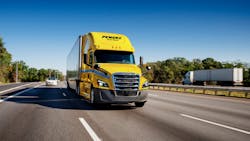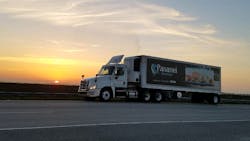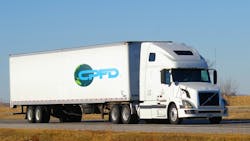Fleets seek increased flexibility, uptime when leasing
Year over year, the contractual leasing business has remained relatively steady, and since the COVID-19 pandemic took its toll on the U.S. economy, there has been a more noticeable trend toward fleets buying used or leasing newer equipment. That’s partly because many fleets have become over-fleeted—having too many assets at once—explained Jim Lager, senior vice president of sales for Penske Truck Leasing, which has a truck fleet of more than 327,000 units and roughly 780 facilities in North America.
“Right now, prices are down because of the over-truck situation,” said Lager. “In some cases, [customers] are not de-fleeting; they have older trucks and don’t know what to do with them. We make it easy for them to get rid of older equipment and get their drivers in new equipment.”
According to Lager, Penske helps fleets spec vehicles with the proper equipment and technology that makes sense for their business. Fleets have also found that a benefit to leasing comes in terms of the total cost to operate vehicles over the long-term, as lease payments remain relatively steady over the course of the term.
Before it began leasing equipment, MPG Transport, a regional waste and recycling hauler in middle Tennessee and Southern Kentucky, had just 10 to 15 trucks, according to Cleve Guinn, chief financial officer. The hauler’s fleet now comprises 43 day cab tractors; 23 of which are lease units and 20 the company purchased new and maintains.
MPG Transport moves approximately 20,000 tons of material per month and utilizes roughly 300 trailers and roll-off boxes to get the job done.
“We had an opportunity for growth in our industry and partnering with Penske allowed us to size up our fleet without having any increase in stress on our maintenance shop,” Guinn noted. “The increased fleet size allowed us to become the largest recycling hauler in our region. Without the opportunity to grow our fleet with Penske I do not see us having as much success over the last eight years.”
The nature of the hauling business is extremely demanding on equipment, so maintenance can be problematic for many refuse fleets.
“We always seem to teeter on the edge of asking too much of [the equipment],” Guinn explained. “Finding issues on the pre- and post-trip inspection is paramount in preventing catastrophic failures.”
For Quirch Foods, which is based in Coral Gables, Fla., leasing has provided several benefits to the fleet of more than 175 power units, which include day cabs, sleepers, straight trucks and trailers. The fleet comprises a solid mixture of owned to leased equipment used to serve its customer base of independent and chain supermarkets, food service distributors, processors and manufacturers, cruise lines, and restaurants.
Katherine Cadavid, Quirch Foods’ transportation manager, said some benefits of leasing include lower upfront cost, shorter commitments, and less risk. She added that the ease of maintenance and ability to upgrade equipment earlier are attractive. Quirch Foods, which leases equipment through Penske, has also found that downtime is less of a problem.
“If a tractor is in the shop for maintenance, [Penske] will provide a subunit to utilize so you do not incur any equipment downtimes,” explained Cadavid. “When you are leasing newer equipment, they provide interim equipment while you are waiting for that new piece of equipment to be built. They have a great network of shops across the country to make it easier to have different terminals in different locations across the country.”
“Getting the local Quirch teams to connect with the local Penske team to work as one team would be the challenges we have faced,” Cadavid added. “Each can provide their own unique view of equipment upkeep, once they work together the process for scheduling, and maintenance PMs can become seamless.”
Coastal Pacific Food Distributors, Inc., based out of Stockton, Calif., has 75 tractors, 150 refrigerated (reefer) trailers, and five reefer trucks—all of which are full-service leased through Penske. Coastal Pacific is the premier distributor to the Defense Commissary agency in the Western U.S., and according to Tim Tveitnes, chief operating officer, it is imperative the fleet is efficient and dependable, as the Commissary is the main destination for military members and their families to shop for groceries.
“Full-service leasing means no maintenance concerns,” Tveitnes said. “We turn the fleet over quicker, stay up with technology, and have no risk throughout the term. Moreover, it allows us to conserve capital to use in other parts of our business.”
“The number of Penske facilities and the 24/7 roadside assistance are very crucial value adds for us,” he added. “By utilizing Penske fueling services, and through regular PMs catching issues before they become problems, have proven to increase our uptime.”
According to Lager, Penske also works to help customers right-size their fleet via its sell to lease program. Overall, the main goal throughout the pandemic has been trying to provide fleets with the flexibility they need to keep running.
About the Author

Cristina Commendatore
Cristina Commendatore is a past FleetOwner editor-in-chief. She wrote for the publication from 2015 to 2023.


